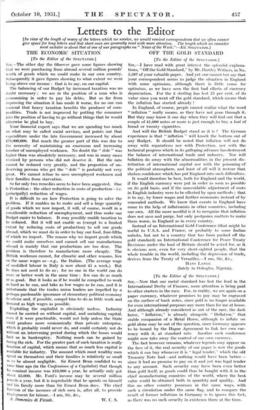Letters to the Editor
[In view of the length of many of the letters which we receive, we would remind correspondents that we often cannot give space for long letters and that short ones are generally read with more attention. The length which we consider most suitable is about that of one of our paragraphs on " News of the Week."—Ed. SPECTATOR. I THE ECONOMIC SITUATION [To the Editor of the SPECTATOR.] Sia,—The other day the Observer gave some figures showing that we were purchasing from abroad several million pounds' 'worth of goods which we could make in our own country. Subsequently it gave figures showing to what extent we were living above our income : that is to say, on our capital.
The balancing of our Budget by increased taxation was no doubt necessary ; we are in the position of a man who is economizing in order to pay his debts. But so far from improving the situation it has made it worse, for no one can contend that heavy taxation benefits the producer of com- modities. Trade is not improved by putting the consumer into the position of having to go without things that he would otherwise be glad to buy.
Your financial expert says that we are spending too much on what may be called social services, and points out that expenditure under the late Government increased by about £78,000,000. But much the greater part of this was due to the necessity of maintaining an enormous and increasing number of unemployed workmen. No doubt the " dole " was higher than was absolutely necessary, and was in many cases received by persons who did not deserve it. But the rate cannot be reduced very greatly, and the proportion of un- deserving persons who get the " dole " is probably not very great. We cannot refuse to save unemployed workmen and their families from starvation.
So'far only two remedies seem to have been suggested. One is Protection : the other reduction in costs of production--i.e. (principally) reduction of wages.
It is difficult to see how Protection is going to solve the
problem. If it enables us to make and sell a large quantity of goods which we now import, it will, of course, result in a considerable reduction of unemployment, and thus make our Budget easier to balance. It may possibly enable taxation to he reduced. But it will not enable us (except to a limited extent by reducing costs of production) to sell our goods abroad, which we must do in order to buy our food, four-fifths of which we import. The reason why we import goods which we could make ourselves and cannot sell our manufactures abroad is mainly that our productions are too dear. The problem- is therefore to manufacture more cheaply. The British workman cannot, for climatic and other reasons, live on the same wages as — e g . , the Italian. (The average wage of unsldlled labour in Italy is now about £1 a week.) But he does not need to do so ; for no one in the world can do more or better work in the same time : few can do as much or as good. But it looks as if he would be compelled to work as hard as he can, and take as low wages as he can, and it is unfortunate that the trades union leaders are impelled by a perhaps pardonable ignorance of elementary political economy to advise and, if possible, compel him to do• as little work and demand as high wages as possible.
Exploiting the capitalist is obviously useless. Industry
cannot be carried on without capital, and socializing capital, even if it were practicable, would not help unless the State could produce more economically than private enterprise, which it probably could never do, and could certainly not do without an intervening period during which the losses would land us in bankruptcy. Nothing much can be gained by taxing the rich. For the greater part of such-taxation is really taxation of capital, which means that so much less capital is available for industry. The amount which most wealthy men spend on themselves and their families is relatively so small as to be almost negligible. Sir Ernest Benn confided to us some time ago (in the Confessions of a Capitalist) that though his nominal income was £10,000 a year, he actually only got about £3,000. Mr. Ford's income may be several million Pounds a year, but it is improbable that he spends on himself and his family more than Sir Ernest Benn does. The chief function of the incomes of rich men is, after all, to provide employment for labour.—I am, Sir, &c.,


















































 Previous page
Previous page